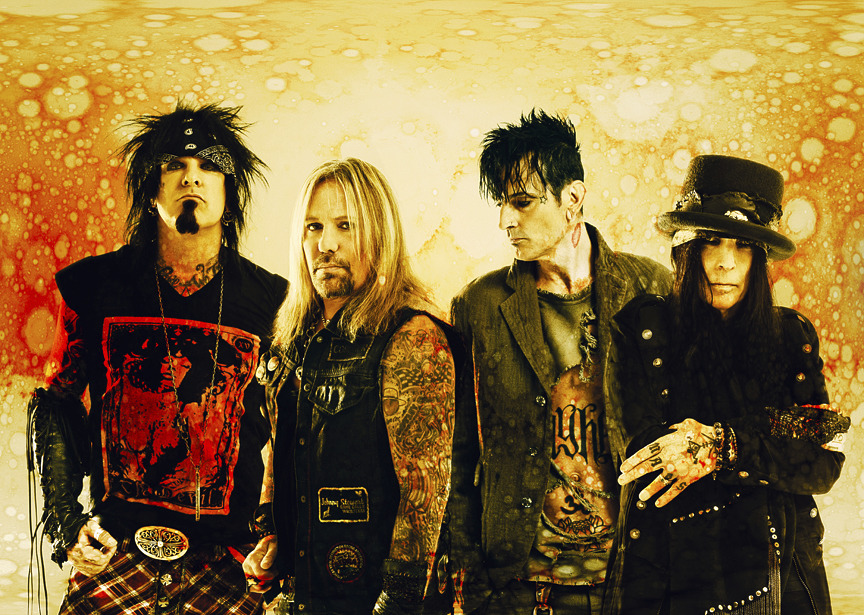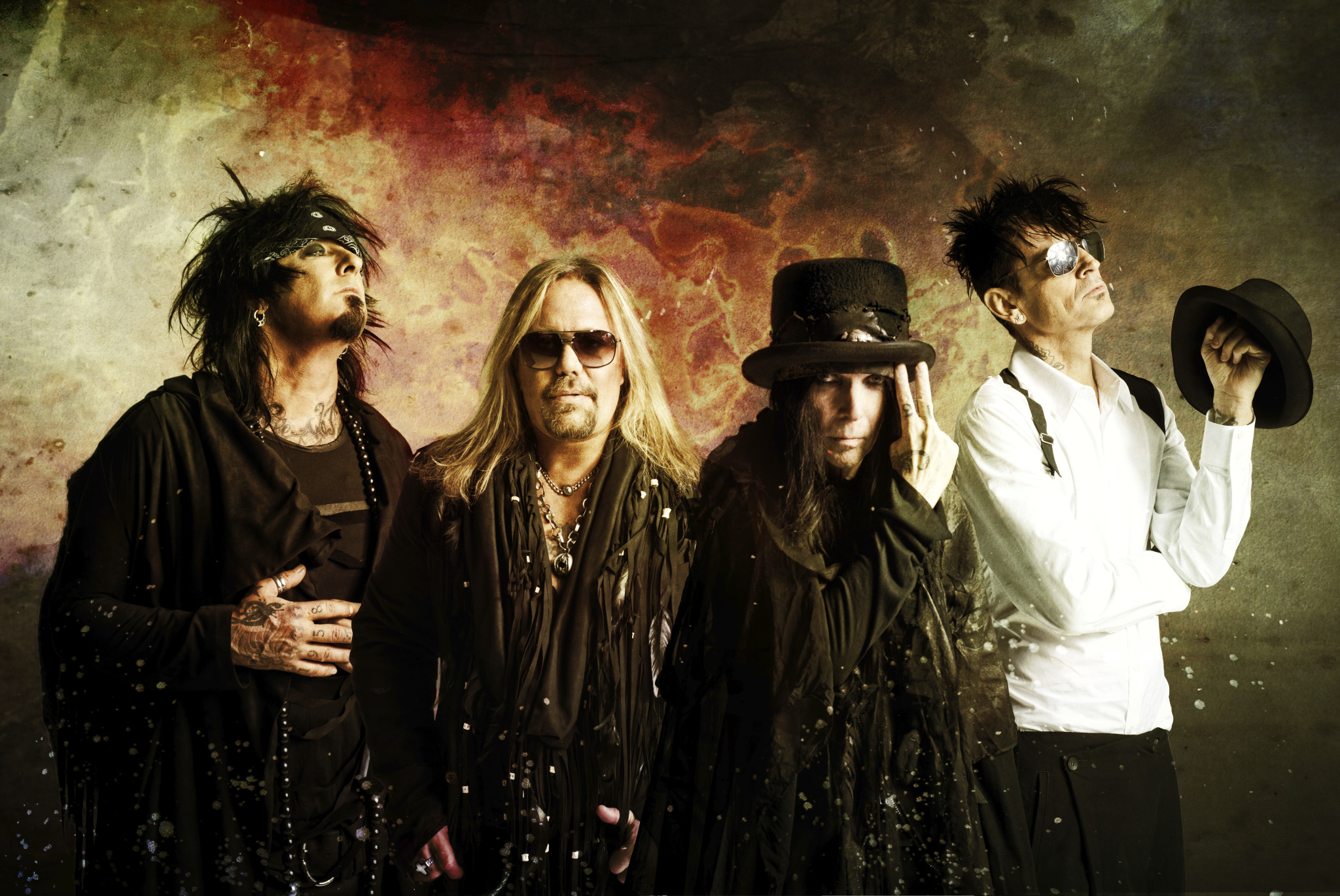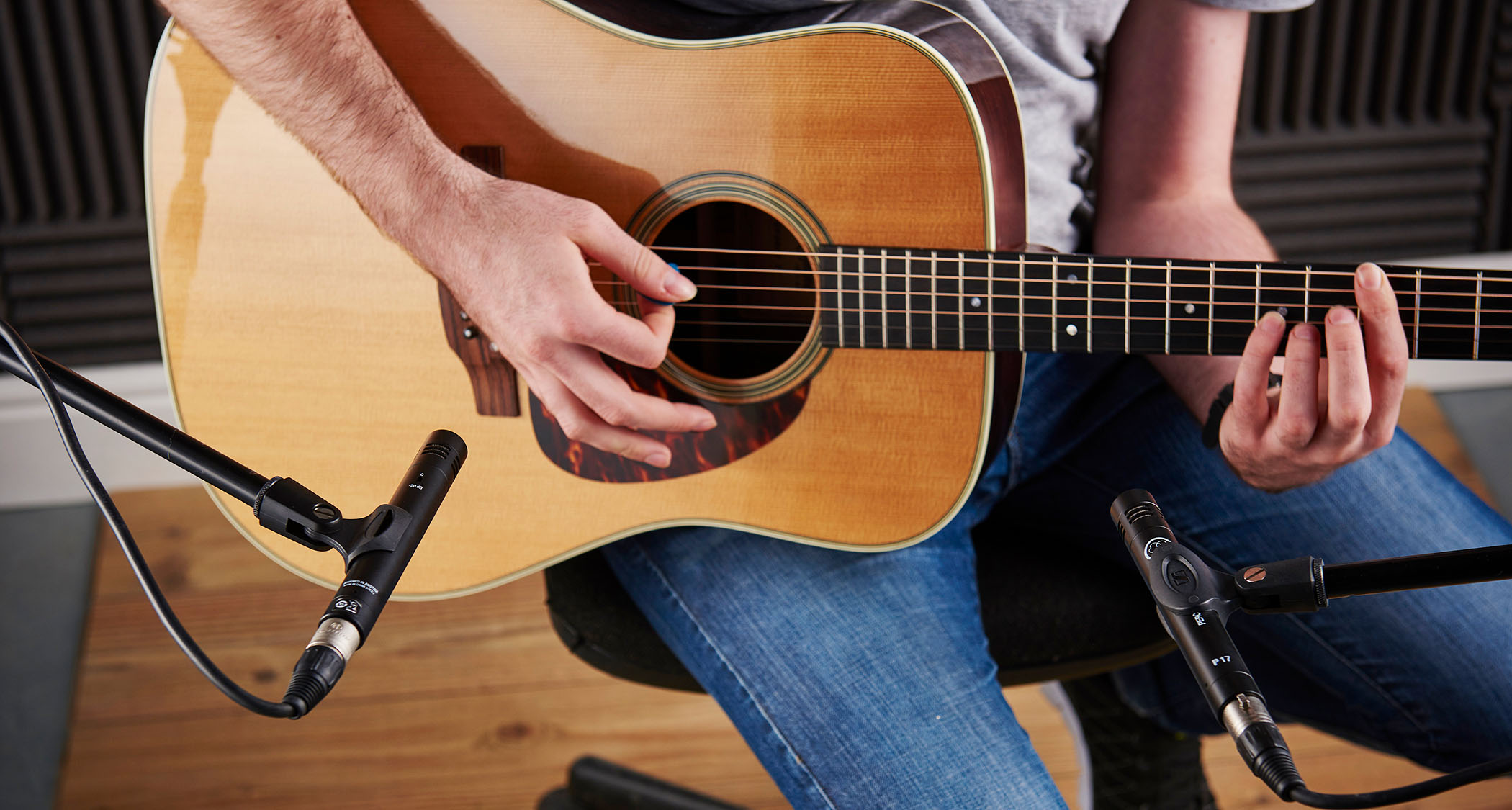Nikki Sixx and DJ Ashba Talk New Sixx:A.M. Album, 'Prayers for the Damned Vol. 1'
Back on New Year’s Eve 2015, Nikki Sixx played his last-ever concert with Mötley Crüe, a sold-out blowout at Los Angeles’ Staples Center replete with plenty of blood, sweat, fire—and, yes, even a few tears shed. It was a fitting end to a more than 30-year career of music and mayhem, not to mention the capper to a massively successful globetrotting tour.
And yet, when Guitar World catches up with Sixx just three months later, the 57-year-old bassist and songwriter is not only gearing up for the release of Prayers for the Damned Vol. 1, the new album from his other band, Sixx:A.M., but also another large scale tour, one that will see the group perform at festivals and headline in clubs in the U.S. and abroad before heading out in arenas as support for a yet-to-be-named act.
Immediately following all this activity, Sixx:A.M. will release another new album, one that was written and recorded at the same time as Prayers for the Damned and acts as a companion to the record. It’s an incredibly full plate for even a 20-something musician, much less one three decades beyond that who, it bears repeating, just recently took part in one of the biggest musical farewells in history.
Which begs the question: What, exactly, is the matter with Nikki Sixx?
The bassist laughs. “There’s a lot the matter with me! And you know, I understand why people would say, ‘Well, he was in a huge band, he made a lot of money, now he should just get fat and go to sleep.’ But here’s the thing: writing new music, being in a great band, pushing myself as an artist, having a musical brotherhood, all of that is exciting to me. The idea of not doing it anymore would be painful.”
There’s also something else. “Look, man,” Sixx says, turning more serious. “I’m not trying to be macabre or morose, but I’m on the dark side of 50, right? There’s more years behind me than in front of me. I know that. So my question to you is, knowing that truth, should I just stop? Or…should I run faster?”
Given Sixx’s upcoming schedule, it’s clear what he feels is the right answer. But the fact is there is another reason for this sudden burst of activity in the Sixx:A.M. camp. For the first time since the band’s inception almost a decade ago, the three founding members—Sixx, guitarist DJ Ashba and singer James Michael—can now firmly say that Sixx:A.M. is their main musical priority.
All the latest guitar news, interviews, lessons, reviews, deals and more, direct to your inbox!
Along with the now Mötley-less Sixx, Ashba, who last summer departed Guns N’ Roses after a six-year tenure, and Michael, an in-demand producer who has worked with everyone from Meat Loaf to Halestorm to Kelly Clarkson, have pledged to devote themselves fulltime to the band. And so, what was once a side project is now the main event.
“Up until now we really haven’t had the opportunity to be a group,” Ashba says. “I was doing the Guns thing, Nikki was doing Mötley and James was producing. But when we went out and did a few dates for our last album [2014’s Modern Vintage], it just felt really good. And that was when we finally decided, ‘Let’s just do this thing full time.’ ”
As for how Prayers for the Damned ended up being the first of two albums they will put out this year (the second, yet untitled, is scheduled for a fall 2016 release), Ashba says, “We just have a lot to say. We have a lot of music that we want to get to the fans, but we didn’t want to do it as just a typical double album. Because double albums have a bad rap. So we went into the studio and said, ‘Let’s do two separate records that complement each other and release them the same year at different times.”
And yet, Sixx also makes a point of stressing that the two efforts are not concept albums. At least, not exactly. “The answer is yes and the answer is also no,” Sixx says. “There’s definitely some glue—for instance, DJ designed the artwork to both records, and the covers will actually fit together and make one piece of art. And the last song on Prayers, ‘Rise of the Melancholy Empire,’ how it ends is also sort of the way the first song on the next one begins. But, are there recurring themes like with [The Who’s] Tommy or Quadrophenia? No. But that said, we recorded both albums at the same time, so sonically there’s a definite consistency there.”
Indeed, the two new albums share a similar sound—but it should also be noted that they’re actually quite different when compared to Sixx:A.M’s past work. For starters, Prayers for the Damned is without a doubt the band’s heaviest and most aggressive offering to date, a circumstance which didn’t come about by accident. “With these records, our sole intention was to turn up the volume,” Sixx says. “Turn up the energy, turn up the aggression, turn up the messaging in the lyrics. Turn up everything.”
The reason for this is partly due to the fact that the three members now view Sixx:A.M. as a “live band,” which is not the way it has always been. Their 2007 debut, The Heroin Diaries, was conceived as a soundtrack of sorts to Sixx’s book of the same name.
Says Ashba, “We got together at that time just as friends. I teamed up with Nikki and we were doing some writing work for different artists, like Drowning Pool. And then one day Nikki brought his diaries into the studio and we started tinkering around with some ideas. We said, ‘It’d be amazing just to write songs for fun, to bring this book to life musically.’ And originally, the plan was to write an album that would actually go inside his book. For each song, we thought about reaching out to a different singers, like maybe Chester Bennington on one, Steven Tyler on another. James [Michael] came into the picture because he was a guy I had worked with for many years, and I knew him as an amazing producer. But then he sent over a song and when we heard his vocals we were just like, ‘Fuck, that’s it!’ So the three of us got together and wrote what became The Heroin Diaries.”
Over the following years the three would reconvene when schedules permitted, eventually recording and releasing two more full-length albums and a handful of EPs (Ashba and Michael also co-wrote and co–produced Mötley Crüe’s final album, 2008’s Saints of Los Angeles). “But because we were just doing Sixx:A.M. around all these other things, we were working more as a studio band and writing these kind of ‘theatrical’ albums,” Ashba says. “We never really thought of it as a thing that was meant primarily for the stage.”
Now, all that has changed. With Sixx, Ashba and Michael committed fulltime to the band, they’re planning to hit the road hard. “Knowing that this was going to be the case when we went in to do these albums, we said to each other, ‘If we’re going to be a touring band from here on out, we need to have some heavy, arena-rock songs,” Ashba says. “We wanted to have these great songs to pull from when we go to play live.” And indeed, Prayers for the Damned is an album that begs to be brought to the stage. From the roiling riffs of opener “Rise,” to the propulsive groove and uplifting, hooky chorus of “You Have Come to the Right Place” to the midtempo grind and gang-vocal chants of “When We Were Gods,” the album combines a classic-rock mentality—grandiose themes, heroic solos, anthemic choruses—with a thick and muscular modern-rock sound.
And much of that sound, it should be pointed out, is built upon Ashba’s guitar playing, which is the focal point of the new music. “Look, I know with these albums I have a lot to prove,” Ashba says. “I left one of the biggest bands in the world to follow my heart and do my own music. So there’s this sense of, ‘I have to really step it up.’ So my whole thing was, I wanted to make a guitar-heavy album and be able to get really creative with the rhythm playing and the solos. I wanted to push myself as hard as I possibly could.”
According to Sixx, he did. “Sixx:A.M. is really DJ’s opportunity to show people what he’s made of,” he says. “This band is like a playground where we don’t have to follow the rules. And for a guitar player, that allows him to be open to stretch out with solos and rhythms, to play interesting countermelodies, to come up with chord structures that are not necessarily familiar to the ear but still very satisfying. And I have to say, I’ve worked with a lot of guitarists over the years, and DJ’s one of the top guys. I’m really proud to be in a band with him. When we’re playing I can always look over and say, ‘That motherfucker…he’s on it.’ He’s never off. He nails it live, and he nails it in the studio.”
When it came to the studio, Ashba tracked much of his rhythms and solos using his new signature Schecter guitar, which includes, among other features, a Strat-style body, a Floyd Rose tremolo equipped with an EVH D-Tuna and a Sustainiac pickup in the neck position. “It fits the way I play,” he says. “It’s not even available to the public yet, but I used the prototype all over the records.” He ran the Schecter through a Kemper Profiling amp, which, he says, “was modded with my own tones. We didn’t use any of the ones that come with it.” Effects were fairly minimal; a Morley wah can be heard on some of his solos and rhythms, and he employed a DigiTech Whammy Pedal for his leads on songs like “When We Were Gods.”
The Whammy Pedal also served in another role, acting as something of a secret weapon when it came to constructing Ashba’s incredibly thick—yet still tight-sounding—rhythm tone. “Everybody’s looking for a big heavy sound, and tuning their guitars super, super low and using seven-strings to do it,” Ashba says. “That’s all cool, but for me, I wanted to capture that heaviness but still be able to play without the strings flopping on the fretboard. So what I did on these albums was I tuned to standard, just with my low string dropped down to D. I recorded my rhythms, and then I went back and did them with the Whammy Pedal dropping everything down a whole octave. So there are some nice low tones, but without the guitar having to be detuned so much.”
Sixx, meanwhile, played his signature Schecter bass in the studio. “And then we just used a lot of plug-ins,” he says. “I don’t remember offhand exactly which ones, but everything for me usually winds up being some version of an Ampeg SVT and an 8x10 cab. And one of my favorite things in the studio was a pedal called the [Malekko] B:Assmaster. That played a key role in a lot of elements of my sound. It’s a distortion pedal but it also affects the tone, sometimes in kind of a bad way, so you get these really magical parts. You can hear the B:Assmaster all over a song like ‘You Have Come to the Right Place,’ especially in the breakdown of the verses. But I like to have that little bit of distortion. I think it’s the fuzz around the edges that creates a really great tone, especially onstage.”
For Sixx and Ashba, the stage is what they’re most looking forward to. “Going out there and seeing these songs that we wrote together connecting with people…I can’t explain what that feels like,” Ashba says. “There’s nothing else like it. Which, he says, explains why he opted to leave Guns N’ Roses. “It had nothing to do with the reunion, or any problems internally,” he says. “To this day, I love Axl to death, and I’m super-happy for the reunion. As a fan, I can’t wait to go see them live. But this was just something I had to do for me. And, I mean, I had a great gig, and not many people in my position would have done something like this. But I’m really proud of this new record, and also of the fact that the three of us are willing to go out and prove ourselves as a band. Just roll up our sleeves and dive in. It’s gonna take a hell of a lot of hard work, but we’re down to do it. And we’re gonna take this thing right up to the top.”
Sixx concurs. “There’s just so much juice in this band right now. And to tell you the truth, by the time all is said and done, and the two albums are out and we’ve finished up the touring…the next record will probably almost be done! People are saying to us, ‘You guys have to slow down…’ ”
He continues. “But listen, I’ve been doing this a long time. And with Mötley, we did everything we said we were going to do. There was nothing left for us to say—we took every ounce of milk out of the tit. So when I stepped off that stage on New Year’s Eve, I was ready for the next adventure in my life. And here it is. And when the fire’s hot, you’ve gotta take advantage. When the energy in the band and the creativity and the friendship is there, you’ve gotta go for it. And Sixx:A.M. is going for it.”


Rich is the co-author of the best-selling Nöthin' But a Good Time: The Uncensored History of the '80s Hard Rock Explosion. He is also a recording and performing musician, and a former editor of Guitar World magazine and executive editor of Guitar Aficionado magazine. He has authored several additional books, among them Kurt Cobain: Montage of Heck, the companion to the documentary of the same name.

